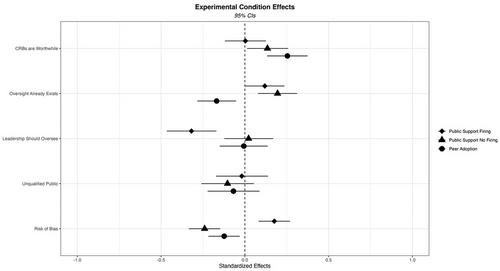This study investigates how information about public opinion and peer practices influences police executives' views on civilian review boards. We applied structural topic modeling in an experimental paradigm, a novel approach diverging from traditional experimental survey methods, to the open-ended responses of 1331 police executives collected in an original survey experiment. This technique enables the capture of subtle shifts in belief directly from the executives' own words. The experiment systematically varied the information provided to police executives, including state-level public opinion data from a representative sample of 16,840 U.S. residents, and peer practices in major city police agencies. Our findings reveal that police executives, although generally aligned in their views, demonstrate a readiness to update their beliefs when presented with cohesive local public opinion and information about peer practices in policing.
In a democratic society, the core policy beliefs of police executives critically shape the existence and efficacy of civilian oversight mechanisms. Our findings demonstrate the adaptability of police executives in updating their policy positions, reflecting their commitment to informed decision making in response to the dynamic nature of police governance. We find that police executives are willing to update their beliefs related to the public's ability to oversee policing in an unbiased and qualified manner when presented with information about reforms adopted by peer agencies. In contrast, information about public demand for more aggressive forms of oversight can lead to a backlash, increasing the likelihood of police executives to favor existing oversight mechanisms and to doubt the public's qualification. For executives, reformers, and scholars, these findings highlight the limitations of public opinion and benefits of peer influence as mechanisms for policy learning in policing.



